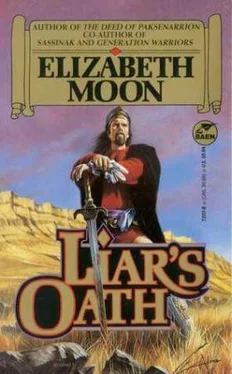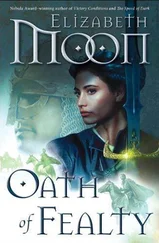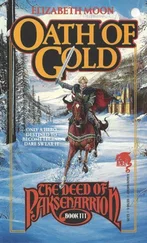Gingerly, he edged toward it. The little chamber opened, then enclosed him, as if he completed it. Its walls held the same graved patterns he remembered, that Gird had traced with his thumb, that Luap had devoured with his eyes, trying to remember them. Spiral on spiral, coil in coil, lacing and interlacing. He turned, slowly, following the pattern . . . it felt strong , and meaningful, but he could not read it. A bad taste came into his mouth: another failure.
On the chamber’s floor, curiously clean of dust, multicolored tessellations glowed in his light, inviting. A different pattern, in which color as well as line interacted, in which his eye was teased, frustrated, satisfied, and finally released with a snap that echoed in his head. He looked up.
And up.
He stood, not in the small bell-shaped chamber of the cave, but in a lofty hall, larger than the Lord’s Hall in Fin Panir, lit by unshadowed silvery light. He could see no windows, no source for the light. He stood on a pattern like that on which he began, but set on a raised dais large enough for a score to stand uncrowded. All his hair rose; cold chills shook him; his own pulse thundered in his ears.
At last he could hear and see clearly again, only to find great silence and unmoving space about him. He did not want to speak, and risk waking whatever power held sway here, but courtesy demanded some greeting. In his mind, he recited the opening phrases to the first ritual he remembered, something out of his childhood, the morning greeting to the Sunlord. Around him, unbroken silence changed its flavor from austerity to welcome. Was he imagining it? He took a slow, shuffling step forward, away from the pattern. Nothing. He was not sure what he half-expected, but he felt like a child exploring forbidden adult territory. For an instant, such a moment flashed before his eyes, a tower bedroom crowded with furniture, rich hangings, a bed piled with pillows, and the furious eyes, four of them, that glared at him before an angry voice rose and whirled him away on its own power.
No. He was grown, and whoever that had been must have died in the war, if not before. He fought down the fear that trembled in his knees and walked forward, off the dais, across a pattern of black and white stones, to the high double arch that closed the end of the hall. Not truly closed, for he could see less brightly lit space beyond, but he didn’t want to walk under those arches. At the top of one, a harp and tree intertwined; on the other, a hammer and anvil. He shivered: he could not imagine a place where elves and dwarves would both choose to carve their holy symbols. He turned back.
The dais, at that distance, seemed apt for a throne; he closed his eyes, and let himself imagine seeing one there, and himself—no, not on the throne, but walking up the hall toward it. His imagination peopled the hall with vivid colors, the richly dressed lords and ladies of his childhood. Music would fill the hall, harp and drum and pipe, and from that celebration no one would be sent away, solitary, to cry in the dark. His power prodded him from within, responding to some influence he could not directly sense.
He opened his eyes. He could still see what it would be like, but—he shook his head to force the vision away—that was daydream, and this was—if not reality—at least something less tuned to his wish. It lay empty, gracefully proportioned, but blank stone, not filled with the friends he had never had.
Soon he realized that it must be all under stone somewhere, for in his cautious exploration he found no window, no door, no hint of outside weather or time. Fresh air, in currents so gentle he could not detect a source, lighted corridors and chambers, all carved of seamless red stone, all empty, all silent but for his footfalls echoing from the walls. No sign of living things, not the Elder Races he assumed had built it, or the animals that should be inhabiting any such underground warren. He dared not explore too far; he went cold again at the thought of being trapped here forever, in some vast nameless tomb, if he lost his way back to the main hall.
Then it struck him that he might be trapped anyway. Would the pattern work again, and if it did would it bring him back to the cave he knew? Trembling, he placed himself on the dais, on the pattern, as precisely as he could. With a last look around, he concentrated on the pattern, and his own power. A cold shiver, as if touched by ice, and he was back in a bell-shaped chamber. The same such chamber? He intensified his own light, and went back toward the cave mouth . . . to find there the embers of his fire, his blanket, his damp socks now dry on the hot stones. He felt almost faint with relief.
All that night he sat crosslegged with his back against the rock, hardly aware of the rain outside or the smell of horse. In his head, the puzzle pieces would not merge, made no sense. What kind of place was this? What kind of place was that? Twice he found himself on his feet, headed back to the chamber to see if it would work again, and twice he forced himself back to the fire. He shouldn’t try it again until he’d thought it out, and thinking at it wasn’t the same as thinking it out.
Should he tell Arranha? He could imagine the priest’s eager questions, his childlike curiosity. Arranha would tell everyone else, hoping to stumble on someone with more lore, if it were but fireside tales. He didn’t want others to know yet, not until he knew more himself. The Rosemage would want to come try it for herself; she might keep it a secret from everyone but Gird, but she would not let the knowledge rest idle—she would insist that he do something with it. And telling either of them meant that Gird would find out, and Gird would not overlook the use of magery if he found out through someone else. So—should he tell Gird first? That would mean admitting the use of magery, unless he could claim that the pattern acted without his power—and lying to Gird was always, no matter how good the reason, tricky. At best. At worst, Gird would hit him again (he rubbed his scalp, remembering).
The next day, in the rain-wet woods between Soldin and Graymere, he argued with himself and his internal images of Gird, Arranha, the Autumn Rose. Surely the gods would not have given him the power, shown him the inner cave, if they had not meant him to use them. In his head, Arranha agreed, pointing out that using magery where no one could see it, where it could affect no one but himself, was very like using no magery at all. It had not been oathbreaking, because he had not sought power, or influenced anyone, or taken command unbidden. The Autumn Rose also approved; he imagined her striding along that vast hall as if she owned it: she fit that sort of space. She would want to know where it was; she would want to know who had been there before, who built it, who used it now. He had a moment’s vision of her confronting a troop of very surprised dwarves somewhere in those warrens, and almost laughed.
Gird, though. Gird stood in his head foursquare and awkward. You used magery, that image said, scowling. Only a little, and it didn’t hurt anyone, he answered. And look what I found. Excuses, said Gird’s image in his mind. Truth’s truth, lad: you swore to give up the mage powers, and you used them. Even in his own mind, Gird had the stubbornness of a great boulder in a field, or a massive oak; he felt that his own arguments scratched around and around, going nowhere and moving that obstruction not even the width of a fingernail.
By Graymere, he’d convinced himself to tell the Autumn Rose and no one else until she’d had a chance to try the pattern herself. She might agree to keep it secret from Gird until she had used it, or tried to; perhaps Gird would accept that if Luap explained he had wanted confirmation from someone else before “bothering” Gird. Between Graymere and Anvil, by way of Whitberry, he changed his mind, and planned to tell only Arranha. Arranha, for all his skewed approach to things, would be more likely to know what those symbols carved in the arches meant, if there had been a time when elves and dwarves worked stone together. Approached carefully, he might be willing to keep this secret, at least for awhile. But on the long, muddy track back to Fin Panir from Anvil, he realized that he would have to tell Gird, and risk the consequences. If Gird found later that others had known, he would not forgive—he would not even listen. His one chance was to tell Gird first, and hope that curiosity had not completely abandoned the Marshal-General.
Читать дальше












